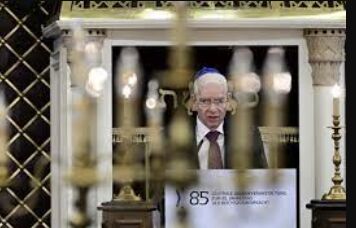Germany Unites Against Rising Antisemitism: Commemorating Kristallnacht 85 Years On
People gathered in Germany to commemorate Kristallnacht and address rising antisemitism. Chancellor Olaf Scholz expressed concern over discrimination faced by Jews and called for zero tolerance towards antisemitism. The event takes place amidst a surge in antisemitic incidents following the Israel-Hamas conflict. Holocaust survivor Herbert Traube expressed dismay at the lack of societal reaction and Jews living in fear. President of the Central Council of Jews in Germany, Josef Schuster, called for introspection and criticized pro-Palestinian demonstrators. Some within the Jewish community feel that more needs to be done to ensure their safety. The commemoration serves as a reminder to fight against antisemitism and protect the Jewish community.
Germany Comes Together to Commemorate Kristallnacht and Address Rising Antisemitism People across Germany gathered on Thursday to mark the 85th anniversary of Kristallnacht, also known as the Night of Broken Glass, a brutal event in 1938 during which the Nazis targeted Jews throughout Germany and Austria. Chancellor Olaf Scholz and Germany's main Jewish leader, Josef Schuster, delivered speeches at a ceremony held at a Berlin synagogue that was recently attacked with firebombs.
During his speech, Chancellor Scholz expressed his deep concern over the rising antisemitism in Germany, particularly in relation to the recent Israel-Hamas war. He described the discrimination faced by Jews as a disgrace and emphasized that any form of antisemitism is not tolerated in German society. The commemoration of the pogrom takes place against the backdrop of a sharp increase in antisemitism in Germany.
Following the Israel-Hamas conflict, which erupted in early October and resulted in the deaths of thousands of Palestinians and Israelis, antisemitic incidents have surged. Recent protests, both far-right and leftist, have witnessed calls for the death of Jews and the destruction of Israel. The historical significance of Kristallnacht cannot be understated. On November 9, 1938, the Nazis targeted Jewish businesses, killed at least 91 people, vandalized thousands of synagogues, and arrested thousands of Jewish men. This event marked a turning point in the persecution of Jews that ultimately led to the Holocaust, in which 6 million European Jews were murdered.
Holocaust survivor Herbert Traube, who personally experienced Kristallnacht, expressed his dismay at the resurgence of antisemitism and the lack of a strong societal reaction against it. Many Jews currently live in fear, attempting to conceal their identities and avoiding neighborhoods that have witnessed violent pro-Palestinian protests. President of the Central Council of Jews in Germany, Josef Schuster, noted that something has gone wrong in the country and called for introspection about what has been overlooked or ignored. He criticized the openness with which pro-Palestinian demonstrators have called for the death of Jews and the destruction of Israel, and highlighted the increasing hatred of Jews by far-right and leftist extremist groups.
While the German government has demonstrated its support for Israel and vowed to protect the Jewish community, some within the community feel that not enough has been done to ensure their safety. Anna Segal, manager of the Berlin Jewish community Kahal Adass Jisroel, said that the response from authorities after the recent attack on the synagogue has been inadequate and called for a more robust commitment to Jewish security. The commemoration of Kristallnacht serves as a reminder of the atrocities of the past and the ongoing battle against antisemitism. It is a call to action for German society to address the resurgence of hatred and discrimination and to ensure the safety and freedom of the Jewish community in Germany.




